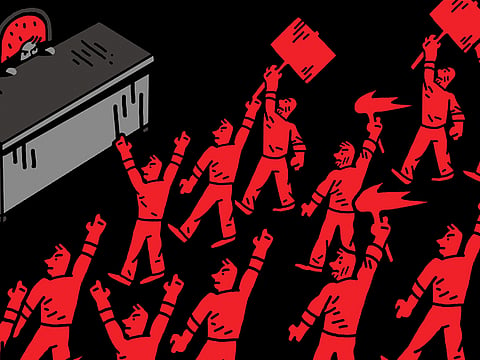Public frustration fires Iraq protests
If the political leaders do not act fast enough, the demonstration could quickly spiral out of control

The Baghdad government and the Iraqi political class need to look at the bigger picture. They must stop playing with people’s lives. The kleptocracy that continues to dominate Iraqi politics, where the booty is divided among a “closed sectarian and ethnic elite”, has to give way to a system that benefits all. Government ministers and politicians must act quickly if they want to stop the protests that have engulfed the country and are now openly calling for regime change.
These protest movements are no longer isolated but appear to be linked to most of the southern and central parts of the country. They are mainly Shiite political constituents feeding into the political classes and the parliamentarians of Baghdad. They can no longer sit on the sidelines and bear the power cuts, dirty drinking water, high unemployment, bad economy and corruption that is endemic, all of which have gone on for many years.
The spark that lit the fire was Basra where the scorching summer heat has become unbearable. Lack of jobs and poor wages added to the popular frustration against the ruling elites. Government buildings and offices of branches of political parties were ransacked because of persistent failures to deliver on the economic fronts. Burning Basra can be compared to Saidi Abu Said, the flame that led to the Tunisian Revolution and eventual departure of Zine Al Abidine Bin Ali and started the so-called Arab Spring back in early 2011.
This time around and like before that, the Basra spark quickly spread to eight Iraqi governorates in the south of the country — in Shiite strongholds like Najaf, Karbala, Nassariya and Amra — and the central parts of the Iraq and Baghdad. Unlike previous protests that started in 2015, these demonstrations that started on July 8 appear to be sustained and are likely to continue. They are no longer isolated with demands for jobs, better living standards, no power cuts and an end to corruption. The political masters of Baghdad — headed by Haider Al Abadi, the current caretaker prime minister — are wary of the protests and demonstrations. Al Abadi quickly tried to pacify the people by promising to pump $3 billion (Dh11 billion) in big projects. I wonder why he didn’t do that earlier, after all, he has been in power since 2014. Now the people neither trust him nor the political establishments. They’ve heard it all before, all talk but no action.
What people want today is a political quick fix, a turnaround to their dire economic situation, and not just in Basra but the whole of the country. They are in a hyper-political state and no longer prepared to wait for the fruits of the projects outlined by the prime minister because they are going to take a long time to implement. The country is no longer facing an existential political threat as the government and its army had beaten Daesh and ended their last vestiges of terror by early 2018. This is something which had kept Iraqis waiting, but the threat is now no longer there, and people are no longer willing to make sacrifices. They see a country with abundant oil resources — the second highest petroleum reserves in the world — and therefore it has the capability to provide for them.
Silence of the political class
This crisis that can be fixed with judicious planning, but the state seems more keen on quelling these protests. Special forces were sent to fight the protesters with firearms, and water-cannons were used. At least 18 people were killed, and around 500 civilians were injured.
All this occurred in the first two weeks of the protests with the numbers increasing all the time. The political class continues to remain silent, expecting the protests to die down. But this is no ordinary situation, unlike anything we have seen before. Politicians are worried about things getting out of hand, and Al Abadi has already appealed to Saudi Arabia and Kuwait to ensure constant supplies for the electrical generators in Basra to alleviate the power cuts. Kuwait has been quick to respond fearing a mass exodus towards its borders if the situation is not rectified. Saudi Arabia is also expected to help soon.
Iran has been supplying power to Basra. They’ve since stopped because Iran itself is facing power shortages and Iraq owes them $1.5 billion in electricity bills. People, mainly Shiites, are increasingly expressing anti-Iranian sentiments because of Iran’s support of political elements like Hadi Al Amiri, a firebrand Iraq politician who is openly pro-Tehran.
Economic malaise and stagnation have reduced Iraq to a mess. If the political powers do not act quickly enough, the protests could spiral out of control.
Marwan Asmar is a commentator based in Amman. He has long worked in journalism and has a PhD in Political Science from Leeds University in the UK.


